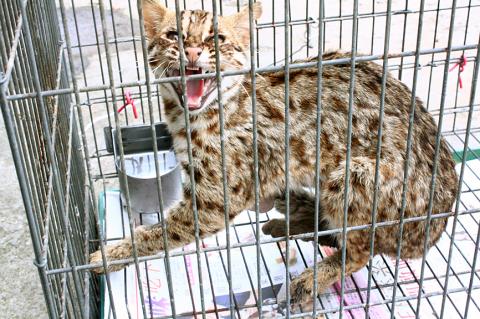A leopard cat found last month in Miaoli County’s Gongguan Township (公館) is recovering from injuries and dehydration, the Miaoli County Unique Animals Preservation Association said yesterday.
The leopard cat is an indigenous wild cat that is endangered and protected. According to research by National Pingtung University’s Institute of Wildlife Conservation, there are fewer than 1,000 in the country.
Called leopard cats because of their leopard-like spots, the animals are marked with twin white stripes across the forehead and are slightly larger than domestic cats, but have long thick tails and are nocturnal carnivores.

Photo: Ho Tsung-han, Taipei Times
The association said it found the leopard cat on Cianshan (淺山) in Gongguan with its right front leg caught in a trap. Association director Lin Ching-chi (林清棋) alerted the county’s Agriculture Department and sent the leopard cat to a veterinarian.
The mating season for leopard cats is from December to April, and the routes the cats take tend to follow the paths of their prey and are unpredictable, Lin said, adding that the leopard cat the association found could have been caught in the trap for as long as eight days.
There were maggots in its wounds and the cat was lucky that it rained recently or it would have died of dehydration, Lin said. After the veterinarian amputated the limb and injected the cat with nutrients, it gradually regained its health, he added.
Meanwhile, the county’s Agriculture Department yesterday reminded the public that if they found leopard cats preying on domestic animals, they should not attempt to capture or kill them, but contact the local fire station.
Capturing or selling leopard cats is against the Wildlife Conservation Act (野生動物保育法) and is punishable with a prison sentence of six months to five years, along with a fine of NT$200,000 to NT$1 million, the department said.
Translated by Jake Chung, Staff Writer

Nipah virus infection is to be officially listed as a category 5 notifiable infectious disease in Taiwan in March, while clinical treatment guidelines are being formulated, the Centers for Disease Control (CDC) said yesterday. With Nipah infections being reported in other countries and considering its relatively high fatality rate, the centers on Jan. 16 announced that it would be listed as a notifiable infectious disease to bolster the nation’s systematic early warning system and increase public awareness, the CDC said. Bangladesh reported four fatal cases last year in separate districts, with three linked to raw date palm sap consumption, CDC Epidemic Intelligence

The manufacture of the remaining 28 M1A2T Abrams tanks Taiwan purchased from the US has recently been completed, and they are expected to be delivered within the next one to two months, a source said yesterday. The Ministry of National Defense is arranging cargo ships to transport the tanks to Taiwan as soon as possible, said the source, who is familiar with the matter. The estimated arrival time ranges from late this month to early next month, the source said. The 28 Abrams tanks make up the third and final batch of a total of 108 tanks, valued at about NT$40.5 billion

Two Taiwanese prosecutors were questioned by Chinese security personnel at their hotel during a trip to China’s Henan Province this month, the Mainland Affairs Council (MAC) said yesterday. The officers had personal information on the prosecutors, including “when they were assigned to their posts, their work locations and job titles,” MAC Deputy Minister and spokesman Liang Wen-chieh (梁文傑) said. On top of asking about their agencies and positions, the officers also questioned the prosecutors about the Cross-Strait Joint Crime-Fighting and Judicial Mutual Assistance Agreement, a pact that serves as the framework for Taiwan-China cooperation on combating crime and providing judicial assistance, Liang

A group from the Taiwanese Designers in Australia association yesterday represented Taiwan at the Midsumma Pride March in Melbourne. The march, held in the St. Kilda suburb, is the city’s largest LGBTQIA+ parade and the flagship event of the annual Midsumma Festival. It attracted more than 45,000 spectators who supported the 400 groups and 10,000 marchers that participated this year, the association said. Taiwanese Designers said they organized a team to march for Taiwan this year, joining politicians, government agencies, professionals and community organizations in showing support for LGBTQIA+ people and diverse communities. As the first country in Asia to legalize same-sex